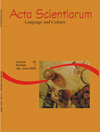<b>O paradoxo na Teoria da Argumentação na Língua: uma questão linguístico-argumentativa</b> - DOI: 10.4025/actascilangcult.v31i2.6543
Resumen
Na Teoria da Argumentação na Língua (TAL), o conceito de paradoxo está ligado à hipótese de que ele pode ser definido em termos puramente linguísticos. Nessa definição, entende-se que há uma argumentação estruturalmente relacionada a algumas expressões das línguas naturais. Esse conceito indica que a argumentação na língua está ligada a algumas palavras e às suas argumentações internas. Por meio da análise de encadeamentos paradoxais, definidos por Oswald Ducrot e Marion Carel (2001), na TAL, este artigo tem o propósito de mostrar que alguns tipos de paradoxo podem ser explicados em termos puramente linguísticos, sem serem considerados contraditórios, absurdos ou, até mesmo, de difícil compreensão.Descargas
DECLARAÇÃO DE ORIGINALIDADE E DIREITOS AUTORAIS
Declaro que o presente artigo é original, não tendo sido submetido à publicação em qualquer outro periódico nacional ou internacional, quer seja em parte ou em sua totalidade.
Os direitos autorais pertencem exclusivamente aos autores. Os direitos de licenciamento utilizados pelo periódico é a licença Creative Commons Attribution 4.0 (CC BY 4.0): são permitidos o acompartilhamento (cópia e distribuição do material em qualqer meio ou formato) e adaptação (remix, transformação e criação de material a partir do conteúdo assim licenciado para quaisquer fins, inclusive comerciais.
Recomenda-se a leitura desse link para maiores informações sobre o tema: fornecimento de créditos e referências de forma correta, entre outros detalhes cruciais para uso adequado do material licenciado.




















6.png)









